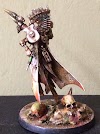 Let's cut to the chase: I don't hate this module.
Let's cut to the chase: I don't hate this module.I do, however, hate the shift in adventure design -- and Dungeons & Dragons itself -- that it heralded. When it was released in 1984, Dragons of Despair was a revelation to me and, I suspect, many other gamers. We'd already seen glimpses of the coming paradigm shift in earlier work by Tracy Hickman, such as "The Desert of Desolation" series and, of course, Ravenloft, but neither of those precursors was as ambitious or as ultimately successful as was the Dragonlance series of modules.
Consisting of fourteen modules published over two years, the DL adventures chronicled -- and that is the right word -- the exploits of a group of pre-generated heroes as they attempted to battle the forces of evil that arose in the aftermath of an apocalypse that left the world of Krynn bereft not just of hope but of the power of the gods themselves. Along the way, these heroes acquire not only experience and power but also a variety of plot complications that propel them into the heights of fantasy melodrama that left many gamers begging for more. Whether they knew it or not, Dragonlance was exactly what a sizable portion of the D&D-buying public wanted and these modules were among the most successful ever made by TSR.
I fell under the sway of Dragonlance too, but the magic of these modules wasn't all-encompassing. Even at the time, I chafed at the pregenerated characters and their predefined relationships and story arcs. I also found the world of Krynn a bit too "twee," as our UK friends might say. So, I chucked the setting and the characters and transported the core of the adventures to a world of my own construction, using characters of my players' own devising. Thus, there was no Tanis Half-Elven or Tasslehoff Burrfoot in my Dragonlance -- indeed they were no kender at all (or tinker gnomes, for that matter). There were characters in my campaign that were somewhat like their Dragonlance counterparts, but that was inevitable, given that Hickman drew on the same fantasy archetypes as my players. The main difference, as I recall it, was that my players -- then, as now -- tended to create somewhat more morally ambiguous characters than those first appearing in Dragons of Despair. This worked rather well, since the cleric of the party (he had no spells, as per Dragonlance canon) was something of a con man and snake oil salesman. That he should become the first true cleric in a generation -- and the cleric of the goddess of healing, no less -- made for some great roleplaying. Indeed, watching what was, in many ways, a rather typical D&D adventuring party slowly become heroes in spite of themselves was one of the primary joys of my ill-fated experiment with Dragonlance.
And that's a terrible shame, because I think, in principle, that Dragonlance could have been one of the most amazing things ever attempted with Dungeons & Dragons. It could have been a glorious framework for the creation of a grand epic involving your characters in your campaign world rather than an exercise in heavy-handed auctorial fiat. My own Dragonlance campaign eventually died, because, as more modules were released, it became ever more clear that each character had a plot arc that the modules simply assumed would be accepted, even when that arc involved the death of said character. That made it increasingly hard for me to adapt the rest of the module material, however much I liked it (and liked it I did in several cases). After a while, it didn't feel like we were playing D&D anymore so much as acting out a fantasy novel that someone else had written.
Of course, that's exactly what Dragonlance was and it's the reason I talk such smack about it. I don't think the idea of Dragonlance is a bad one -- far from it. I do, however, think the implementation of it by TSR was exceedingly poor and fostered and encouraged many baleful trends in the hobby. Had this series included more -- any! -- tool kit material to help the referee adapt it to his own campaign and players, I'd probably still be a Dragonlance fan today. I know, in hindsight, that what I wanted could never have happened in 1984. Heck, I'm not convinced it could even happen in 2008, given both gamer tastes and the difficulty in producing what would essentially be a customizable series of campaign aids rather than an "epic in a box."
Still, a guy can dream, can't he?






0 Yorumlar